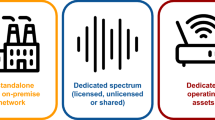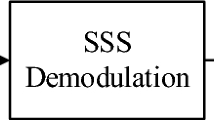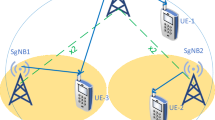Abstract
Cognitive Radio Networks (CRNs) have paved a road for Secondary Users (SUs) to opportunistically exploit unused spectrum without harming the communications among Primary Users (PUs). In this paper, practical unicast and convergecast schemes, which are overlooked by most of the existing works for CRNs, are proposed. We first construct a cell-based virtual backbone for CRNs. Then prove that SUs have positive probabilities to access the spectrum and the expected one hop delay is bounded by a constant, if the density of PUs is finite. According to this fact, we proposed a three-step unicast scheme and a two-phase convergecast scheme. We demonstrate that the induced delay from our proposed Unicast Scheduling (US) algorithm scales linearly with the transmission distance between the source and the destination. Furthermore, the expected delay of the proposed Convergecast Scheduling (CS) algorithm is proven to be upper bounded by \(O(\log n + \sqrt{n/\log n})\). To the best of our knowledge, this is the first study of convergecast in CRNs. Finally, the performance of the proposed algorithms is validated through simulations.











Similar content being viewed by others
Notes
In this paper, a cell conducts a data transmission (respectively, guaranteed data transmission) means a SU in this cell conducts a data transmission (respectively, guaranteed data transmission) to another SU in this cell or in neighboring cells.
References
Akyildiz IF, Lee WY, Vuran MC, Mohanty S (2006) NeXt generation/dynamic spectrum access/cognitive radio wireless networks: a survey. Comput Netw 50:2127–2159
Dousse O, Baccelli F, Thiran P (2003) Impact of interferences on connectivity in ad hoc networks. In: INFOCOM 2003, pp 1724–1733
Han C, Yang Y (2011) Information propagation speed study in multihop cognitive radio networks. In: INFOCOM 2011, pp 226–230
He J, Cai Z, Ji S, Beyah R, Pan Y (2011) A genetic algorithm for constructing a reliable MCDS in probabilistic wireless networks. In: WASA 2011, pp 96–107
Hu D, Mao S, Reed JH (2009) On video multicast in cognitive radio networks. In: INFOCOM 2009, pp 2222–2230
Huang W, Wang X (2011) Throughput and delay scaling of general cognitive networks. In: INFOCOM 2011, pp 2210–2218
Huang S, Liu X, Ding Z (2009) Optimal transmission strategies for dynamic spectrum access in cognitive radio networks. IEEE Trans Mob Comput 8(12):1636–1648
Huang X, Lu D, Li P, Fang Y (2011) Coolest path: spectrum mobility aware routing metrics in cognitive ad hoc networks. In: ICDCS 2011, pp 182–191
Jeon SW, Devroye N, Vu M, Chung SY, Tarokh V (2008) Cognitive networks achieve throughput scaling of a homogeneous network. IEEE Trans Inf Theory 57(8):5103–5115
Jin J, Xu H, Li B (2010) Multicast scheduling with cooperation and network coding in cognitive radio networks. In: INFOCOM 2010, pp 1–9
Kasbekar GS, Sarkar S (2010) Spectrum pricing games with bandwidth uncertainty and spatial reuse in cognitive radio networks. In: MobiHoc 2010, pp 251–260
Kim H, Shin KG (2008) In-band spectrum sensing in cognitive radio networks: energy detection or feature detection. In: MobiCom 2008, pp 14–25
Kompella S, Nguyen GD, Wieselthier JE, Ephremides A (2011) Stable throughput tradeoffs in cognitive shared channels with cooperative relaying. In: INFOCOM 2011, pp 1961–1969
Li C, Dai H (2011a) On the throughput scaling of cognitive radio ad hoc networks. In: INFOCOM 2011, pp 241–245
Li C, Dai H (2011b) Transport throughput of secondary networks in spectrum sharing systems. In: INFOCOM 2011, pp 2732–2740
Li Y, Thai MT, Wang F, Du DZ (2006) On the construction of a strongly connected broadcast arborescence with bounded transmission delay. IEEE Trans Mob Comput 5(10):1460–1470
Pan M, Zhang C, Li P, Fang Y (2011) Joint routing and link scheduling for cognitive radio networks under uncertain spectrum supply. In: INFOCOM 2011, pp 2237–2245
Ren W, Zhao Q, Swami A (2010) On the connectivity and multihop delay of ad hoc cognitive radio networks. In: ICC 2010, pp 1–6
Ross SM (2007) Introduction to probability models, 9th edn. Elsevier, New York
Shi Y, Hou YT (2008) A distributed optimization algorithm for multi-hop cognitive radio networks. In: INFOCOM 2008, pp 1292–1300
Shu T, Krunz M (2009) Coordinated channel access in cognitive radio networks: a multi-level spectrum opportunity perspective. In: INFOCOM 2009, pp 2976–2980
Shu T, Krunz M (2010) Truthful least-priced-path routing in opportunistic spectrum access networks. In: INFOCOM 2010, pp 1–9
Sun L, Wang W (2011) On distribution and limits of information dissemination latency and speed in mobile cognitive radio networks. In: INFOCOM 2011, pp 246–250
Wang F, Krunz M, Cui S (2008) Spectrum sharing in cognitive radio networks. In: INFOCOM 2008, pp 1885–1893
Wang C, Li XY, Tang S, Jiang C (2010) Multicast capacity scaling for cognitive networks: general extended primary network. In: MASS 2010, pp 262–271
Wang P, Akyildiz IF, Al-Dhelaan AM (2011) Percolation theory based connectivity and latency analysis of cognitive radio ad hoc networks. Wirel Netw 17:659–669
Yin C, Gao L, Cui S (2010) Scaling laws for overlaid wireless networks: a cognitive radio network versus a primary network. IEEE/ACM Trans Netw 18(4):1317–1329
Zhang T, Tsang DHK (2011) Optimal cooperative sensing scheduling for energy-efficient cognitive radio networks. In: INFOCOM 2011, pp 2723–2731
Author information
Authors and Affiliations
Corresponding author
Rights and permissions
About this article
Cite this article
Ji, S., Uluagac, A.S., Beyah, R. et al. Practical unicast and convergecast scheduling schemes for cognitive radio networks. J Comb Optim 26, 161–177 (2013). https://doi.org/10.1007/s10878-011-9446-7
Published:
Issue Date:
DOI: https://doi.org/10.1007/s10878-011-9446-7




